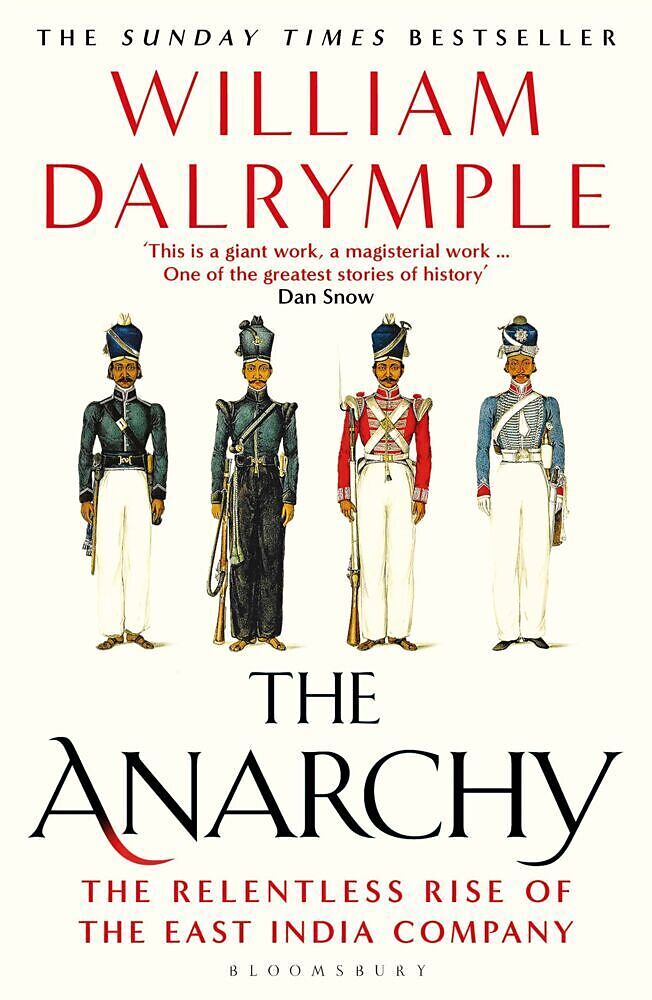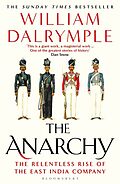

The Anarchy
Beschreibung
THE TOP 5 SUNDAY TIMES BESTSELLER LONGLISTED FOR THE BAILLIE GIFFORD PRIZE FOR NON-FICTION 2019 'Dalrymple is a superb historian with a visceral understanding of India . A book of beauty ' - Gerard DeGroot, The Times In August 1765 the East India Company defea...Format auswählen
- Kartonierter EinbandCHF 20.30
Wird oft zusammen gekauft
Andere Kunden kauften auch
Beschreibung
THE TOP 5 SUNDAY TIMES BESTSELLER LONGLISTED FOR THE BAILLIE GIFFORD PRIZE FOR NON-FICTION 2019 'Dalrymple is a superb historian with a visceral understanding of India . A book of beauty ' - Gerard DeGroot, The Times In August 1765 the East India Company defeated the young Mughal emperor and forced him to establish in his richest provinces a new administration run by English merchants who collected taxes through means of a ruthless private army - what we would now call an act of involuntary privatisation.The East India Company's founding charter authorised it to 'wage war' and it had always used violence to gain its ends. But the creation of this new government marked the moment that the East India Company ceased to be a conventional international trading corporation dealing in silks and spices and became something much more unusual: an aggressive colonial power in the guise of a multinational business. In less than four decades it had trained up a security force of around 200,000 men - twice the size of the British army - and had subdued an entire subcontinent, conquering first Bengal and finally, in 1803, the Mughal capital of Delhi itself. The Company's reach stretched until almost all of India south of the Himalayas was effectively ruled from a boardroom in London. The Anarchy tells the remarkable story of how one of the world's most magnificent empires disintegrated and came to be replaced by a dangerously unregulated private company, based thousands of miles overseas in one small office, five windows wide, and answerable only to its distant shareholders. In his most ambitious and riveting book to date, William Dalrymple tells the story of the East India Company as it has never been told before, unfolding a timely cautionary tale of the first global corporate power.
Probably the best work of a quartet of books that Dalrymple has written focusing on Indian history... Beautifully written and generous in its details; well worth the time and effort**
Vorwort
In his most ambitious book to date, bestselling historian William Dalrymple tells the timely and cautionary tale of the rise of the East India Company and one of the most supreme acts of corporate violence in world history
Autorentext
William Dalrymple is one of Britain's great historians and the bestselling author of the Wolfson Prize-winning White Mughals, The Last Mughal, which won the Duff Cooper Prize, and the Hemingway and Kapuscinski Prize-winning Return of a King. A frequent broadcaster, he has written and presented three television series, one of which won the Grierson Award for Best Documentary Series at BAFTA. He has also won the Thomas Cook Travel Book Award, the Sunday Times Young British Writer of the Year Award, the Foreign Correspondent of the Year at the FPA Media Awards, and been awarded five honorary doctorates. He is a fellow of the Royal Society of Literature, the Royal Asiatic Society and the Royal Society of Edinburgh, and has held visiting fellowships at Princeton and Brown. He writes regularly for the New York Review of Books, the New Yorker and the Guardian. In 2018 he was presented with the prestigious President's Medal by the British Academy for his outstanding literary achievement and for co-founding the Jaipur Literature Festival. He is the co-host of chart-topping podcast Empire with Anita Anand. William lives with his wife and three children on a farm outside Delhi.
Klappentext
THE TOP 5 SUNDAY TIMES BESTSELLER ONE OF BARACK OBAMA'S BEST BOOKS OF 2019 THE TIMES HISTORY BOOK OF THE YEAR FINALIST FOR THE CUNDILL HISTORY PRIZE 2020 LONGLISTED FOR THE BAILLIE GIFFORD PRIZE FOR NON-FICTION 2019 A FINANCIAL TIMES, OBSERVER, DAILY TELEGRAPH, WALL STREET JOURNAL AND TIMES BOOK OF THE YEAR 'Dalrymple is a superb historian with a visceral understanding of India . A book of beauty' - Gerard DeGroot, The Times In August 1765 the East India Company defeated the young Mughal emperor and forced him to establish a new administration in his richest provinces. Run by English merchants who collected taxes using a ruthless private army, this new regime saw the East India Company transform itself from an international trading corporation into something much more unusual: an aggressive colonial power in the guise of a multinational business. William Dalrymple tells the remarkable story of the East India Company as it has never been told before, unfolding a timely cautionary tale of the first global corporate power.
